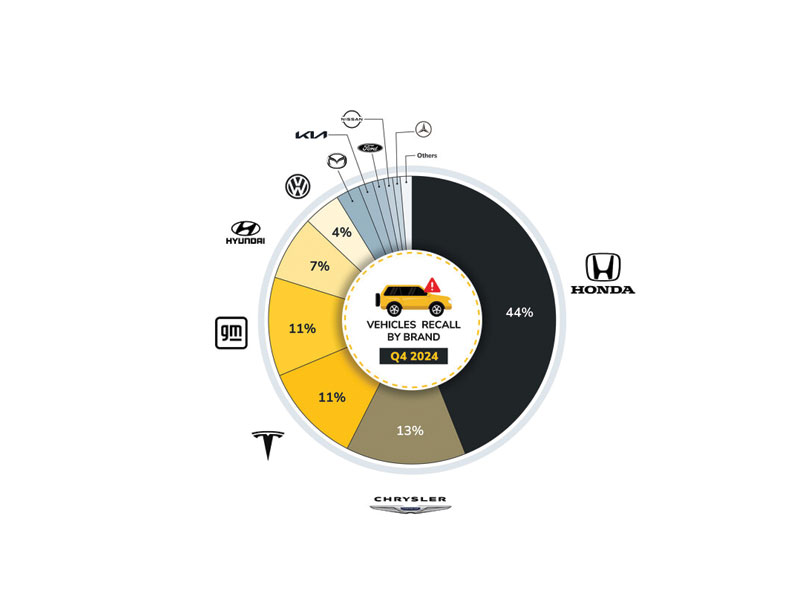BizzyCar, a leading recall management platform for car dealerships that exponentially increases service revenue, has officially published results from its Q4 and Year-End Recall Report, which is designed to document the dominant recall trends that …
BizzyCar, a leading recall management platform for car dealerships that exponentially increases service revenue, has officially published results from its Q4 and Year-End Recall Report, which is designed to document the dominant recall trends that closed out 2024.
According to certain reports, the report found that 2024 saw a meaningful decline in recall numbers (27 million) from 2023 (33 million), but when you factor in un-repaired vehicles from prior years, more than one in four vehicles on U.S. roads have at least one open recall, translating to 72.7 million vehicles currently on the road with recall needs.
Talk about the whole report on a slightly deeper level, we referred to how, with over 27 million vehicles recalled in 2024, the automotive has made significant progress in this area, but even the current number poses a a cause of concern, as nearly 6.1 million of the total vehicles were recalled in Q4 2024 alone.
Next up, the report revealed that Tesla leads in recalls, recalls that materialized due to reasons fixable through OTA. To back that up with numbers, Tesla had more than 5.1 million vehicles affected with issues that can be addressed through Over-the-Air (OTA) updates. However, they were still referred to as recalls because of NTHSA mandate.
Moving on, electrical components were once again deemed as the top recalled component. You see, advanced vehicle technologies drove a monumental uptick in electrical system recalls, accounting for 6.3 million vehicles in 2024.
Another detail worth a mention here is rooted in the fact that top 4 vehicle manufacturers were responsible for over 85% of all Q4 recalls. Here, Honda, Chrysler/Stellantis, Tesla, and General Motors made up the majority of recalls in Q4 2024. This treads up a long distance to showcase concentrated safety challenges among major automakers.
Now, while recalls remain an issue, BizzyCar’s report also discovered an improved recall management with OTA updates. Basically, more than 33% of vehicles recalled in 2024 could be fixed via OTA updates, up from 21% in 2023, reflecting the industry’s shift toward more efficient and customer-friendly recall solutions.
Among other things, the whole study would go on to markedly uncover Ford’s turnaround story. For better understanding, in 2022, the manufacturer issued 8.7 million recalls, but by 2024, this number had dropped to 4.1 million, which makes for reduction of more than 50%. In Q4 2024, Ford issued just 76,000 recalls, a remarkable headway compared to its Q1 peak of 2.2 million.
Apart from that, if we turn our attention towards the largest recalls from Q4 2024, they include Honda, who recalled 2,250,000 of certain 2021-2024 Accord and CR-V models. The reason beyond that was a faulty fuel injector which may cause a fire risk due to potential fuel leak.
Next up, we have Chrysler/Stellantis, who recalled 1,150,000 of certain 2022-2024 Ram 1500 and Jeep Cherokee models. Driving that decision was a software error in the ABS control module which may disable stability control, violating Federal Motor Vehicle Safety Standard number 126, “Electronic Stability Control Systems.”
Alongside that, there is, of course, Tesla, who recalled 696,787 of 2023 Model 3 and Model Y vehicles. Here, the problem was a software bug causing intermittent loss of braking assistance. General Motors also made the cut by recalling 615,000 of certain 2024 Chevrolet Silverado and GMC Sierra models. It did so after a defect in the electronic brake control module begin to prevent warning lights from activating during a fluid leak, violating Federal Motor Vehicle Safety Standard number 135, “Light Vehicle Brake Systems.”
Finally, there was Hyundai, who recalled 450,000 of 2020-2023 Tucson and Santa Fe vehicles after potential short circuit in the anti-lock brake system (ABS) increased fire risk when parked.
“This improvement reflects Ford’s renewed focus on quality assurance, proactive defect detection, and streamlined production processes. By addressing key issues earlier in the manufacturing cycle, Ford has demonstrated a commitment to building safer, more reliable vehicles, positioning itself as a leader in recall management and customer trust restoration,” said Ryan Maher, BizzyCar Founder and CEO. “These trends reveal a concerning landscape in automotive safety with widespread defects impacting millions of vehicles.”




